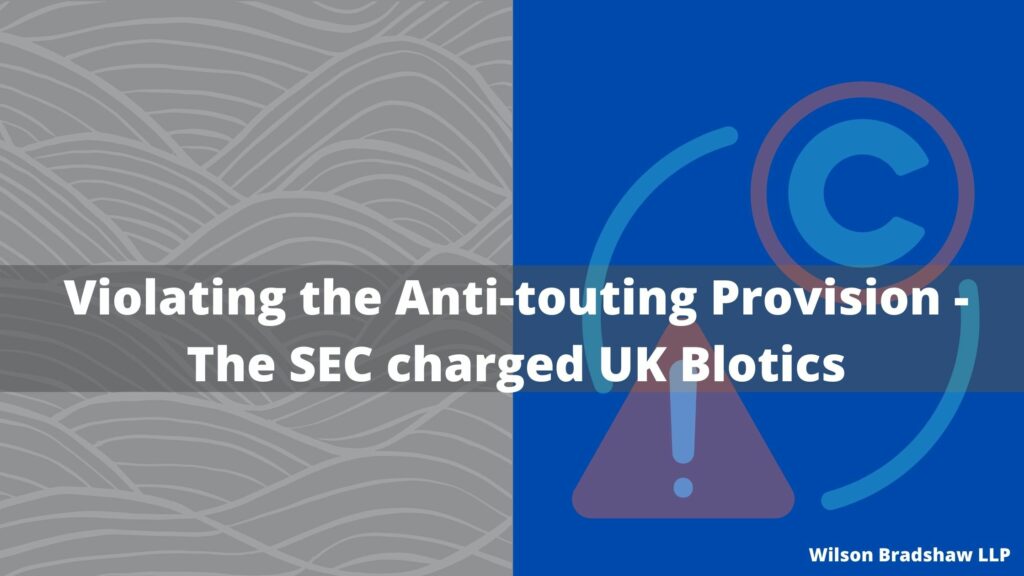Violating the Anti-touting Provision. On July 14th, the Securities and Exchange Commission (“SEC”) charged[1] Blotics Ltd.(Blotics), a website operator based in the UK, for violating the anti-touting provision of the federal securities law. Blotics operated a once-popular digital asset securities offering platform, Coinschedule.com (“Coinschedule”), accessible to US investors from 2016 to 2019. The website charged a fee from issuers who offered their digital asset securities on Coinschedule.com but did not disclose this to the investors. Biotics has since agreed to settle the charge by paying the SEC $43,000 in disgorgement of the ill-gotten and another $154,434 in a civil penalty.
The SEC claimed in the complaint[2] that Coinschedule listed the ongoing offerings or offerings about to go on its homepage. During the relevant period, the platform profiled over 2,500 different token offerings and deal with fundraisings of more than $10 billion in total. In fostering fundraising, Coinschedule connects the investors to information necessary to decision-making and recommends them the “best token offerings.”
Coinschedule created individual panels that displayed the basic information for the issuers and served as links to issuers’ websites for additional information. Besides providing knowledge common to any digital offerings, including the name and logo of the token, the number of token issues, and the allocation of remaining tokens, the panels also indicated which class the offered tokens were in. Whereas Coinschedule classified offerings into Platinum class, Gold class, Silver class, and Basic class, the categorization did not necessarily depend on the quality of the offerings but the money issuers paid. (“Platinum” was the most expensive and “Basic” the cheapest).In addition, Blotics also generated “trust scores” from A to E for each of the offerings and gave instructions to issuers to increase their trust score, for example, uploading issuers corporation documents.
However, the defendant never disclosed the fee Coinschedule charged the issuers. By concealing its charging from the issuers, Coinschedule created a misleading impression that it made unbiased grading to the offerings as an independent agency. It is important to an investor to know that Coinschedule’s grading may not accurately reflect the quality of the offerings. As the tokens on Coinschedule were publicly offered and buyers had a reasonable expectation of profit from them, the SEC considered the tokens to be securities. Consequently, Coinschedule was subject to the federal securities law and failing to disclose the consideration received violated Section 17(b) of the Securities Act.
Kristina Littman of the SEC says, “As the SEC’s order finds, Coinschedule presented potential investors with seemingly independent profiles about token offerings when in fact they were bought and paid for by token issuers. She also says, “the securities law prohibiting touting securities for compensation without appropriate disclosures to investors is clear and longstanding.”
Wilson Bradshaw LLP is a boutique securities law firm in Irvine, California, and New York City. We offer the advantage of a highly focused, experienced legal team that understands business realities. We also provide legal consultation regarding the SEC’s regulations. Our practice is dedicated to helping businesses prosper by providing cost-effective services without compromising quality. Please visit our website or contact us by clicking this link: /location/contact/
Reference:
[1]: https://www.sec.gov/news/press-release/2021-125
[2]: https://www.sec.gov/litigation/admin/2021/33-10956.pdf

